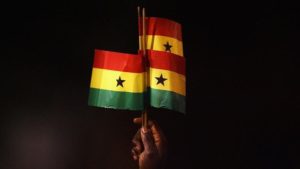
Multiple Ghanaian flags. [Getty Images]
Ghana’s recent history has been a mixed picture of progress and setbacks, marked by democratic stability, economic woes, corruption and pockets of progress amid development, education and health challenges.
Here, we highlight Al Jazeera’s best stories from Ghana, reporting on the state of democracy in Ghana, natural resources and education.
Since their independence, many African countries escaped colonial domination only to enter into a new covert era of resource exploitation.
Ghana witnessed a peaceful transfer of power in its recent elections, in which Nanu Akufo-Addo defeated the incumbent John Mahama in a tight presidential race in December 2016. Mahama had faced criticism from the opposition of financial mismanagement.
In November 2015, Ghana underwent a crisis of confidence in the nation’s judiciary following a corruption scandal. An exclusive Al Jazeera investigation exposed widespread corruption and bribe-taking among several high court judges and many of other court officials.
Ghana was one of Africa’s most dynamic economies for many years, but it slumped in 2014 as commodity prices fell and a fiscal crisis led to a widening budget deficit and rising inflation. The country was forced to turn to the International Monetary Fund for a bailout in 2015.
Despite its economic strife, Ghana is resource rich. Formerly known as the Gold Coast, Ghana is the world’s second-largest producer of cocoa and Africa’s second-largest producer of gold.
However, as a gold rush has drawn thousands of Chinese miners over the past decade, some have questioned the extent to which the nation’s resources are truly benefiting ordinary Ghanaians.
Huge hydroelectric projects initiated in the 1960s aimed to provide Ghana with an abundant supply of power. Ghana has one of the highest rates of electricity in Africa. However, soaring demand and a recent drought, likely attributable to climate change, have hampered the ability of Ghana’s dams to produce enough power and blackouts persist.
The United Nations’ Girls’ Education Initiative reports that Ghana has made “good progress” in narrowing gender gaps and improving access to education for girls.
While girls are roughly equal with boys in terms of primary school enrollment in Ghana, enrollment in secondary education is lower for girls, according to UNICEF.
Read more here


